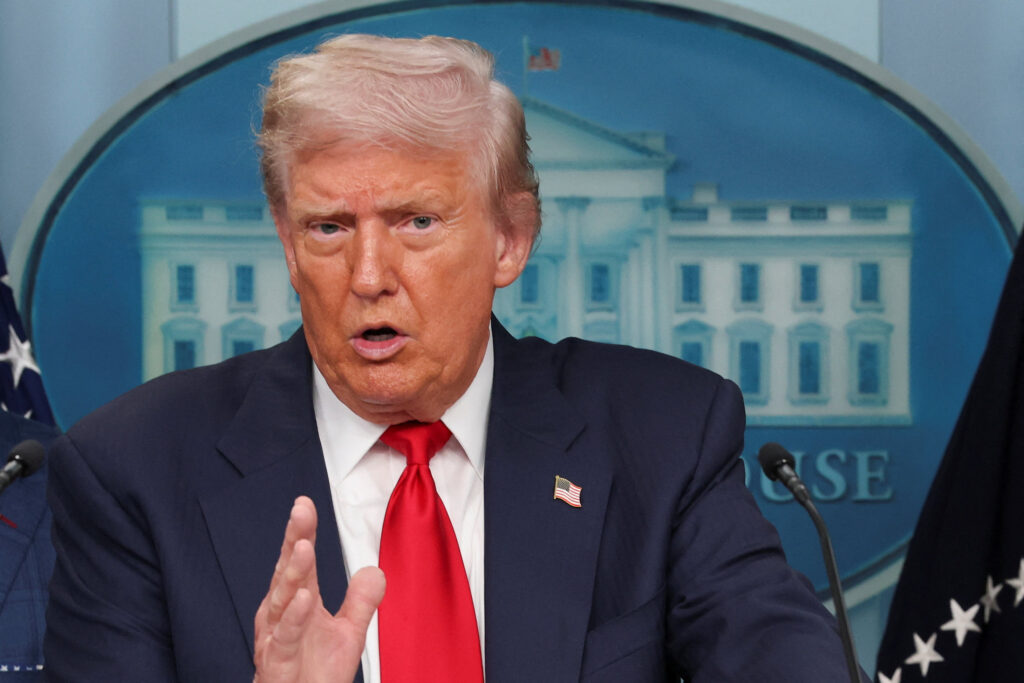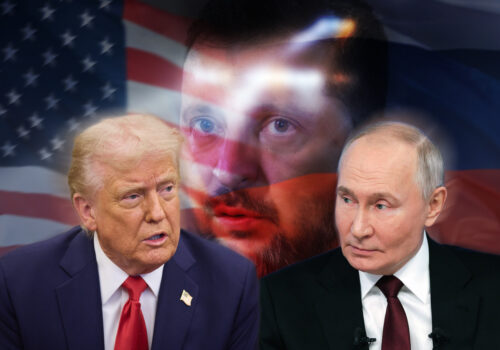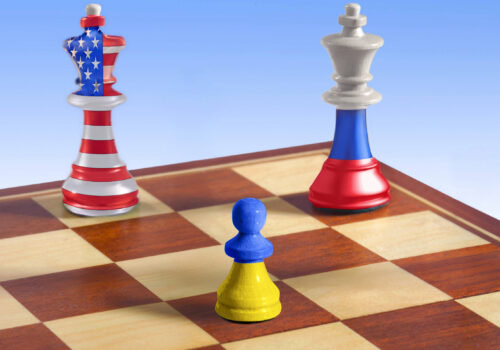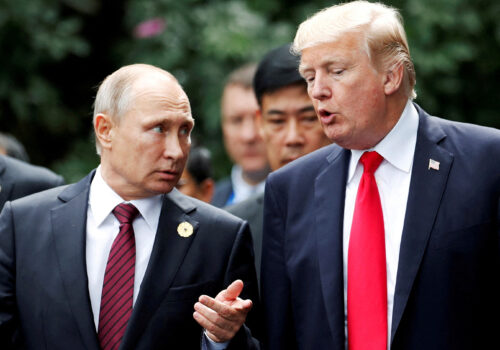The most important square foot in geopolitics is the space between Donald Trump’s ears.
That’s the way a Trump administration insider put it to me a few days ago, betraying pride by association, just as the White House announced the US president’s decision to meet with Russian President Vladimir Putin.
A second Trump administration official told me he believes that what gives Trump such outsized geopolitical influence, some seven months into his administration, starts with his “heterodox” approach to foreign policy. That’s a fancy way of describing his out-of-the-box thinking on issues that have long defied conventional diplomacy. Trump is so confident in his own negotiating skills and in his country’s negotiating leverage that “he doesn’t mind who is on the other side of the table,” whether US friend or foe, the official explained.
When Trump and Putin gather for their summit in Alaska on Friday, it will mark the most significant test yet of Trump’s vaunted heterodoxy. He will sit opposite a Russian leader who has murdered domestic opponents and sent a quarter of a million Russians to their deaths fighting a largely stalemated war in Ukraine for three-and-a-half years. Views on whether Trump should be meeting with Putin at all are roughly divided along the lines of how much faith one has in this “most important square foot in geopolitics.”
Critics such as the Financial Times’ Edward Luce summon the “ghosts of Munich, Yalta and other sordid bargains” ahead of the summit. Luce worries that Trump, who he believes lacks Putin’s grasp of history, could fulfill Ukraine’s worst fears and “give away land in the negotiating chamber that Russia could not win by force of arms.” In the meantime, Putin has escalated his summer assault on Ukraine’s Donetsk region to take as much land as possible before the meeting in Alaska.
What administration officials say should influence Putin and other US negotiating partners most is Trump’s offer to talk directly with Iranian leaders.
Trump’s allies have greater faith in the president’s ability to sniff out when he is being hoodwinked. They point to his willingness to walk away from talks with North Korean leader Kim Jong Un during his first administration, the low expectations he has set for the Alaska meeting, his reassurances to European leaders on Wednesday that he wouldn’t make land deals without Ukraine’s involvement, and his warning thereafter of “very severe consequences” if Putin refuses in Alaska to agree to a cease-fire.
As Marc Thiessen wrote in the Washington Post, “It might help anyone with their hair on fire about Donald Trump’s Alaska summit with Vladimir Putin to look at what the U.S. president has actually said about his negotiating plans.”
Indeed, Trump has set a low bar for what he has called a “feel-out meeting” in Alaska, saying he’ll probably know in the first two minutes whether a deal can get done. “It’s not up to me to make a deal,” he’s said, while at other times unsettling Ukrainians by talking about “land swaps” for peace. They recognize that Russia is occupying their land.
On Wednesday, Trump spoke with Ukrainian President Volodymyr Zelenskyy and European leaders in a virtual meeting co-chaired by German Chancellor Friedrich Merz, French President Emmanuel Macron, and British Prime Minister Keir Starmer. Trump described the call as “a ten.” The Europeans, who are calling themselves the “Coalition of the Willing,” have made a concerted and sustained effort to influence Trump’s thinking and actions, understanding the generational stakes. In a statement after the meeting, they welcomed Trump’s efforts “to stop the killing in Ukraine, end Russia’s war of aggression, and achieve just and lasting peace.” They added, “A diplomatic solution must protect Ukraine’s and Europe’s vital security interests.”
Though Trump doesn’t claim for himself any Kissingerian strategic approach to the world, what he tells his aides is that he’s focused on forcing countries to make a choice: Do they want to work with the United States or not? This question extends to a range of issues, from trade wars to peacemaking. “He’s fundamentally demanding that countries make tough choices to get to the right place,” the administration insider told me, citing most recently Trump’s tough 50 percent tariff threats on India over its support for Russia’s war effort through oil purchases.
What administration officials say should influence Putin and other US negotiating partners most is Trump’s offer to talk directly with Iranian leaders. Only after Tehran shrugged off Trump’s sixty-day deadline for talks did the United States conduct a series of airstrikes on three Iranian nuclear facilities. Operation Midnight Hammer, launched on June 21, involved B-2 stealth bombers and submarines, utilized bunker-buster bombers and Tomahawk missiles, and seriously damaged Iran’s nuclear program. “But it only followed President Trump’s sincere offer of finding a better path forward together,” the administration official underscored, adding, “On Iran, the offer is still on the table. Door still open.”
US officials I spoke with, all of whom shared their thoughts not for attribution, list other examples of Trump’s heterodoxy that extend beyond the military realm. As recently as this past week, for instance, Trump brought Armenian and Azerbaijani leaders to the White House and presided over their signing of a peace framework designed to normalize their relations after nearly four decades of conflict.
“It’s a long time, thirty-five years, they fought, and now they’re friends, and they’re going to be friends for a long time,” Trump said at the White House, with Armenian Prime Minister Nikol Pashinyan and Azerbaijani President Ilham Aliyev seated next to him. “Many tried to find a resolution, including the European Union,” the US president added. “The Russians worked very hard on it; it never happened. Sleepy Joe Biden tried, but you know what happened there.”
The two countries’ leaders said last Friday that they will advocate for Trump to receive the Nobel Peace Prize. “I don’t want to go into the history of some very strange decisions of the Nobel Prize committee to award the prize for somebody who didn’t do anything at all,” Aliyev said. “But President Trump in six months did a miracle.”
That’s the overriding message that Trump is taking to Alaska. It’s that he is succeeding where others have not, often regarding conflicts that have festered for years. He takes some credit for defusing an India-Pakistan crisis in May, for brokering peace between the Democratic Republic of the Congo and Rwanda (signed in the Oval Office in June), and for bringing Cambodia and Thailand to the negotiating table in July. Should the Armenia-Azerbaijan deal hold, it would be a slap to Putin’s face in his own backyard, potentially leading to a greater US role in the region as well as the creation of a transit corridor connecting China and Central Asian countries to Turkey via Azerbaijan.
What sets apart Putin from other world leaders Trump has dealt with is the US president’s far greater patience for the Russian leader’s recalcitrance in negotiations. That has been the case even as Trump has grown increasingly upset with Putin’s continued killing of Ukrainian civilians, which often occurs immediately after the two men have spoken. In Putin, Trump is facing the most profound test yet for his unorthodox approach to foreign policy, and the one that’s likely to have the longest-lasting impact on geopolitics, Trump’s legacy, and his Nobel Peace Prize aspirations.
Back in December, I argued that it would be the outcome in Ukraine that would determine Trump’s worthiness for the Nobel Peace Prize. “It’s hard to overestimate how great a difference his Ukraine-related decisions in the coming weeks will make to the trajectory of his second term,” I wrote at the time. “Trump can either assert or undermine US global leadership for an emerging era of great-power competition that will stretch far beyond his four years in office.” If Trumpian heterodoxy is the key to demonstrating such leadership, the US president will have an opportunity to prove it in Alaska.
Frederick Kempe is president and chief executive officer of the Atlantic Council. You can follow him on X: @FredKempe.
This edition is part of Frederick Kempe’s Inflection Points newsletter, a column of dispatches from a world in transition. To receive this newsletter throughout the week, sign up here.
Further reading
Mon, Aug 11, 2025
Alaska Summit: Trump must press Putin over future Ukrainian security
UkraineAlert By John E. Herbst
Trump-Putin Alaska Summit: If Moscow insists on the acceptance of Russian control over Ukrainian land for a ceasefire, it must accept strong measures to bolster Ukrainian security as well, writes John E. Herbst.
Tue, Aug 12, 2025
Sacrificing Ukraine will only increase the cost of stopping Putin’s Russia
UkraineAlert By
Pressuring Ukraine to accept a Kremlin-friendly settlement may succeed in pausing the current war, but it will not bring peace. On the contrary, it will set the stage for international instability on a far larger scale, writes Pavlo Zhovnirenko.
Fri, Aug 8, 2025
Trump and Putin just announced a meeting in Alaska. What does that mean for the war in Ukraine?
Fast Thinking By
As attention turns to the tête-à-tête in the last frontier, we turn to our experts for their insights on what to expect.
Image: US President Donald Trump speaks to the press about deploying federal law enforcement agents in Washington to bolster the local police presence, in the Press Briefing Room at the White House, in Washington D.C., U.S., August 11, 2025. REUTERS/Jonathan Ernst




